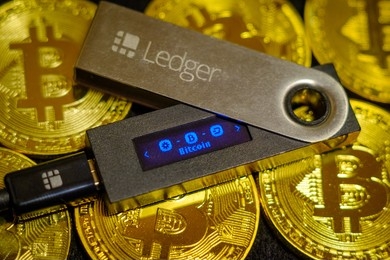Blockchain
Ledger Commits To Full Restitution For Victims Of $600,000 ConnectKit Attack
Published
7 months agoon
By
admin
Hardware wallet manufacturer Ledger has responded to a recent security breach resulting in the theft of $600,000 worth of user assets.
The company has pledged to enhance its security protocols by eliminating Blind Signing, a process where transactions are displayed in code rather than plain language, by June 2024.
Ledger Takes Responsibility For ConnectKit Attack
In a statement, Ledger emphasized its focus on addressing the recent security incident and preventing similar occurrences in the future.
The company acknowledged the approximately $600,000 in assets that were impacted by the ConnectKit attack, particularly affecting users blind signing on Ethereum Virtual Machine (EVM) decentralized applications (dApps).
Furthermore, Ledger pledged to make sure affected victims are fully compensated, including non-Ledger customers, with CEO & Chairman Pascal Gauthier personally overseeing the restitution process.
According to the statement, Ledger has already initiated contact with affected users and is actively working with them to resolve their specific cases.
In addition, by June 2024, blind signing will no longer be supported on Ledger devices, contributing to a “new standard of user protection” and advocating for “Clear Signing,” which refers to a process that allows users to verify transactions on their Ledger devices before signing them across dApps.
On this matter, Ledger’s CEO Pascal Gauthier stated:
My personal commitment: Ledger will dedicate as much internal and external resources as possible to help the affected individuals recover their assets.
Heightened dApp Security Measures
According to an incident report released by the hardware wallet manufacturer, the attack exploited the Ledger Connect Kit, injecting malicious code into dApps utilizing the kit.
This malicious code redirected assets to the attacker’s wallets, tricking EVM dApp users into “unknowingly signing transactions” that drained their wallets.
Ledger addressed the attack by deploying a genuine fix for the Connect Kit within 40 minutes of detection. The compromised code remained accessible for a limited time due to the nature of content delivery networks (CDNs) and caching mechanisms.
Ledger acknowledged the risks faced by the entire industry in safeguarding users and emphasized the need to continually raise the bar for security in dApps.
The company plans to strengthen its access controls, conduct audits of internal and external tools, reinforce code signing, and improve infrastructure monitoring and alerting systems.
Additionally, Ledger will educate users on the importance of Clear Signing and the potential risks associated with blind signing transactions without a secure display.
Notably, with Clear Signing, users are presented with a clear and readable representation of the transaction details, enabling them to review and validate the transaction before providing their signature.
This added layer of transparency and verification helps users mitigate the risks associated with front-end attacks or malicious code injected into decentralized applications
Featured image from Shutterstock, chart from TradingView.com
Disclaimer: The article is provided for educational purposes only. It does not represent the opinions of NewsBTC on whether to buy, sell or hold any investments and naturally investing carries risks. You are advised to conduct your own research before making any investment decisions. Use information provided on this website entirely at your own risk.
Source link
You may like


Taliban jailed 8 traders for holding and using crypto


Solana Struggles to Rise Amid Bitcoin Price Uncertainty


Developing in Web 3.0 Is on the Cusp of a Breakthrough


Digital Shovel Sues RK Mission Critical for Patent Infringement on Bitcoin Mining Containers


crypto will get positive regulation ‘no matter who wins’ election


Toncoin (TON) v Cardano (ADA): On-chain Data Show Gains
Blockchain
Blockchain can combat illicit fund transfers, Nigeria’s top finance investigator says
Published
4 days agoon
June 29, 2024By
admin

Blockchain technology and artificial intelligence (AI) can be used to combat illicit activity, according to Nigeria’s Economic and Financial Crimes Commission (EFCC) chair, Olanipekun Olukoyede.
The stakes are high for Africa. The continent loses a substantial $88.6 billion annually to illegal fund flows.
According to The Guardian, Olukoyede expressed concern that these funds could be better utilized for essential infrastructure, healthcare, and education.
A statement from the Commission’s spokesperson, Dele Oyewale, indicated that Olukoyede made this revelation in Tunis, Tunisia, during a keynote address at the Pan-African Conference on Illicit Financial Flows and Tax evasion.
The conference brought together key stakeholders to explore innovative strategies for asset recovery and financial reintegration in Africa.
Olukoyede also highlighted the difficulties encountered in asset recovery, including technical, legal, and political challenges that complicate the tracing, freezing, and repatriating of illicit funds.
He called for the enhancement of legal and institutional frameworks across African nations to combat IFFs more effectively.
Earlier in May, Olukoyede disclosed that terrorists are increasingly utilizing cryptocurrency traders to fund their activities in the country. According to Olukoyede, some young cryptocurrency traders are unknowingly being exploited by terrorist financiers to move funds, complicating efforts to track and halt these financial flows.
In a concerted effort to combat these illicit activities, the EFCC has blocked 1,146 bank accounts implicated in unauthorized dealings in foreign exchange, money laundering, and terrorism financing in Nigeria.
A significant number of these accounts were found to be connected to peer-to-peer cryptocurrency trading platforms, underscoring the growing intersection between digital currencies and illegal financial operations.
Olukoyede further highlighted the EFCC’s success in recovering $20 million worth of cryptocurrency from fraudsters.
In a notable move to hold cryptocurrency platforms accountable, the EFCC filed criminal charges against Binance, a leading cryptocurrency exchange, and one of its executives, accusing them of money laundering and tax evasion.
The EFCC chairman emphasized the importance of capacity building, robust legal systems, and improved coordination and cooperation at national, regional, and international levels.
He has advocated for using advanced technologies such as data analytics, blockchain, and AI to enhance asset tracking and recovery efforts.
He noted that these emerging technologies could be crucial in combating financial crimes enabled by cryptocurrencies, suggesting a future where advanced tech solutions bolster traditional enforcement measures.
Crypto and money laundering
Cryptocurrency has emerged as a significant facilitator of global money laundering activities, particularly in East and Southeast Asia.
According to the United Nations Office on Drugs and Crime (UNODC) report, cryptocurrencies, coupled with the rise of illegal online casinos and junkets, have contributed to the proliferation of underground banking and money laundering across East and Southeast Asia.
Organized crime groups have exploited vulnerabilities within the cryptocurrency ecosystem and online gambling platforms, using cryptocurrency exchanges and wallets to integrate billions of dollars in illicit proceeds into the financial system. This often involves mixing funds and conducting transactions anonymously.
In Nigeria, the cryptocurrency exchange giant Binance has been embroiled in allegations of $35.4 million in money laundering and tax evasion. CEO Richard Teng claimed to have been blackmailed by unidentified individuals in Nigeria demanding a $150 million cryptocurrency bribe, which the Nigerian government dismissed as baseless and an attempt to divert attention from ongoing investigations into Binance’s operations.
Recognizing the substantial money laundering risks posed by the cryptocurrency sector, the United Kingdom’s Financial Conduct Authority (FCA) highlighted crypto firms, alongside retail banking, wholesale banking, and wealth management, as high-risk areas for exploitation between 2022 and 2023. In response, UK police have deployed crypto tactical advisors nationwide to seize digital assets associated with criminal activities.
On June 4, Weidong “Bill” Guan, the Chief Financial Officer of the Epoch Times, was charged in a $67 million money laundering scheme involving cryptocurrency.
According to the indictment, spanning from 2020 to May 2024, Guan and his “Make Money Online” team allegedly used fraudulently obtained unemployment benefits and stolen identities to acquire prepaid debit cards. These cards were then sold at a discounted rate for cryptocurrency on specific platforms.
The illicit funds were allegedly laundered through various channels, including bank accounts belonging to The Epoch Times, Guan’s personal accounts, and his cryptocurrency holdings.
When financial institutions flagged suspicious transactions, Guan purportedly misrepresented the origins of the funds, claiming they were from legitimate online donations.
Source link
AGIX
Coinbase Won’t Support Upcoming AI Token Merger Between Fetch.ai, Ocean Protocol and SingularityNET
Published
4 days agoon
June 29, 2024By
admin
Top US exchange Coinbase is not going to facilitate the planned merger of multiple artificial intelligence altcoin projects into a single new crypto.
In an announcement via the social media platform X, Coinbase says that customers will have to initiate the merger on their own.
“Ocean (OCEAN) and Fetch.ai (FET) have announced a merger to form the Artificial Superintelligence Alliance (ASI). Coinbase will not execute the migration of these assets on behalf of users.”
In March, Fetch.ai (FET), Singularitynet (AGIX) and Ocean Protocol (OCEAN) announced a plan to merge with an aim to create the largest independent player in artificial intelligence (AI) research and development, which they are calling the Artificial Superintelligence Alliance (ASI).
The merger is happening in phases, beginning July 1st, according to a recent project update.
“Starting July 1, the token merger will temporarily consolidate SingularityNET’s AGIX and Ocean Protocol’s OCEAN tokens into Fetch.ai’s FET, before transitioning to the ASI ticker symbol at a later date. This update enables an efficient execution of the token merger, and outlines the timelines and crucial steps for token holders, ensuring a smooth and transparent process.”
Coinbase says users can effect the merger on their own using their wallets.
“Once the migration has launched, users will be able to migrate their OCEAN and FET to ASI using a self-custodial wallet, such as Coinbase Wallet. The ASI token merger will be compatible with all major software wallets.”
Don’t Miss a Beat – Subscribe to get email alerts delivered directly to your inbox
Check Price Action
Follow us on X, Facebook and Telegram
Surf The Daily Hodl Mix
 

Disclaimer: Opinions expressed at The Daily Hodl are not investment advice. Investors should do their due diligence before making any high-risk investments in Bitcoin, cryptocurrency or digital assets. Please be advised that your transfers and trades are at your own risk, and any losses you may incur are your responsibility. The Daily Hodl does not recommend the buying or selling of any cryptocurrencies or digital assets, nor is The Daily Hodl an investment advisor. Please note that The Daily Hodl participates in affiliate marketing.
Generated Image: Midjourney
Source link
Bitcoin
Protocol Village: Farworld, Building Gaming on Farcaster, Raises $1.75M
Published
2 weeks agoon
June 20, 2024By
admin

The latest in blockchain tech upgrades, funding announcements and deals. For the period of June 20-26.
Source link

Taliban jailed 8 traders for holding and using crypto

Solana Struggles to Rise Amid Bitcoin Price Uncertainty

Developing in Web 3.0 Is on the Cusp of a Breakthrough

Digital Shovel Sues RK Mission Critical for Patent Infringement on Bitcoin Mining Containers

crypto will get positive regulation ‘no matter who wins’ election

Toncoin (TON) v Cardano (ADA): On-chain Data Show Gains

Crypto Markets Like Their Odds With Kamala Harris

How Financial Surveillance Threatens Our Democracies: Part 2

CleanSpark’s amped hashrate mined 445 Bitcoin in June

Ripple and Coinbase Use Binance Win to Contest SEC Claims

DCG, Top Executives Renew Push to Get New York AG’s Civil Fraud Suit Dropped

Introducing Satoshi Summer Camp: A Bitcoin Adventure for Families

US judge approves expedited schedule for Consensys suit against SEC

2 Cryptocurrencies To Buy Boosting Into Top 10

Bitcoin Miners Slow Down Selling In July, What This Could Mean For Price

Bitcoin Dropped Below 2017 All-Time-High but Could Sellers be Getting Exhausted? – Blockchain News, Opinion, TV and Jobs

What does the Coinbase Premium Gap Tell us about Investor Activity? – Blockchain News, Opinion, TV and Jobs
BNM DAO Token Airdrop

NFT Sector Keeps Developing – Number of Unique Ethereum NFT Traders Surged 276% in 2022 – Blockchain News, Opinion, TV and Jobs
A String of 200 ‘Sleeping Bitcoins’ From 2010 Worth $4.27 Million Moved on Friday
New Minting Services

Block News Media Live Stream

SEC’s Chairman Gensler Takes Aggressive Stance on Tokens – Blockchain News, Opinion, TV and Jobs

Friends or Enemies? – Blockchain News, Opinion, TV and Jobs

Enjoy frictionless crypto purchases with Apple Pay and Google Pay | by Jim | @blockchain | Jun, 2022

How Web3 can prevent Hollywood strikes

Block News Media Live Stream

Block News Media Live Stream

XRP Explodes With 1,300% Surge In Trading Volume As crypto Exchanges Jump On Board

Block News Media Live Stream
Trending

 Altcoins2 years ago
Altcoins2 years agoBitcoin Dropped Below 2017 All-Time-High but Could Sellers be Getting Exhausted? – Blockchain News, Opinion, TV and Jobs

 Binance2 years ago
Binance2 years agoWhat does the Coinbase Premium Gap Tell us about Investor Activity? – Blockchain News, Opinion, TV and Jobs
- Uncategorized3 years ago
BNM DAO Token Airdrop

 BTC1 year ago
BTC1 year agoNFT Sector Keeps Developing – Number of Unique Ethereum NFT Traders Surged 276% in 2022 – Blockchain News, Opinion, TV and Jobs

 Bitcoin miners2 years ago
Bitcoin miners2 years agoA String of 200 ‘Sleeping Bitcoins’ From 2010 Worth $4.27 Million Moved on Friday
- Uncategorized3 years ago
New Minting Services

 Video2 years ago
Video2 years agoBlock News Media Live Stream

 Bitcoin1 year ago
Bitcoin1 year agoSEC’s Chairman Gensler Takes Aggressive Stance on Tokens – Blockchain News, Opinion, TV and Jobs

